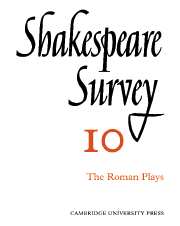Book contents
- Frontmatter
- Shakespeare’s Roman Plays: 1900–1956
- Shakespeare’s ‘Small Latin’—How Much?
- Shakespeare and the Elizabethan Romans
- The Metamorphosis of Violence in Titus Andronicus
- From Plutarch to Shakespeare: A Study of Coriolanus
- The Composition of Titus Andronicus
- Classical Costume in Shakespearian Productions
- Shakespeare’s Use of a Gallery over the Stage
- Lear’s Questions
- “Egregiously an Ass”: The Dark Side of the Moor. A view of Othello’s Mind
- Shakespeare in Schools
- Shakespeare Festival, Toronto, Canada
- International Notes
- Shakespeare Productions in the United Kingdom: 1955
- Drams of Eale, A Review of Recent Productions
- The Year's Contributions to Shakespearian Study 1 Critical Studies
- 2 Shakespeare’s Life, Times and Stage
- 3 Textual Studies
- Books Received
- Index
- Plate Section
The Year's Contributions to Shakespearian Study 1 - Critical Studies
Published online by Cambridge University Press: 28 March 2007
- Frontmatter
- Shakespeare’s Roman Plays: 1900–1956
- Shakespeare’s ‘Small Latin’—How Much?
- Shakespeare and the Elizabethan Romans
- The Metamorphosis of Violence in Titus Andronicus
- From Plutarch to Shakespeare: A Study of Coriolanus
- The Composition of Titus Andronicus
- Classical Costume in Shakespearian Productions
- Shakespeare’s Use of a Gallery over the Stage
- Lear’s Questions
- “Egregiously an Ass”: The Dark Side of the Moor. A view of Othello’s Mind
- Shakespeare in Schools
- Shakespeare Festival, Toronto, Canada
- International Notes
- Shakespeare Productions in the United Kingdom: 1955
- Drams of Eale, A Review of Recent Productions
- The Year's Contributions to Shakespearian Study 1 Critical Studies
- 2 Shakespeare’s Life, Times and Stage
- 3 Textual Studies
- Books Received
- Index
- Plate Section
Summary
John Lawlor tells us that “the liberty of interpreting” resembles “other forms of liberty: we have it on the condition of vigilance”. He is answering an essay by L. C. Knights, reviewed here last year, on the limitations of historical scholarship. Although he does not seriously differ from Knights’ conclusions he takes issue with him and with Abercrombie on some of their arguments. He warns us, quite rightly, that “the present will not come to life in our studies when it is used to galvanize the past” and he refuses to make a distinction between “historical scholarship” and “the Shakespeare experience”.
Some of the year's historical scholarship certainly assists our understanding of Shakespeare. Gladys D. Willcock, for example, devoted her British Academy lecture to a study of the use of rhetoric in his early plays. She helps us to appreciate what Shakespeare was trying to do, though she realizes that though he might never have become a great poet without his rhetorical training, he had to transcend it before he could become great. Robert Hillis Goldsmith is another scholar who enables us to see one aspect of Shakespeare's work more plainly.
- Type
- Chapter
- Information
- Shakespeare Survey , pp. 135 - 143Publisher: Cambridge University PressPrint publication year: 1957

